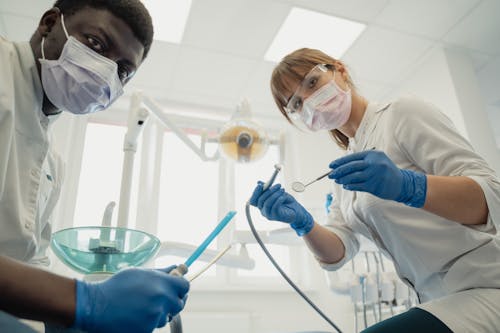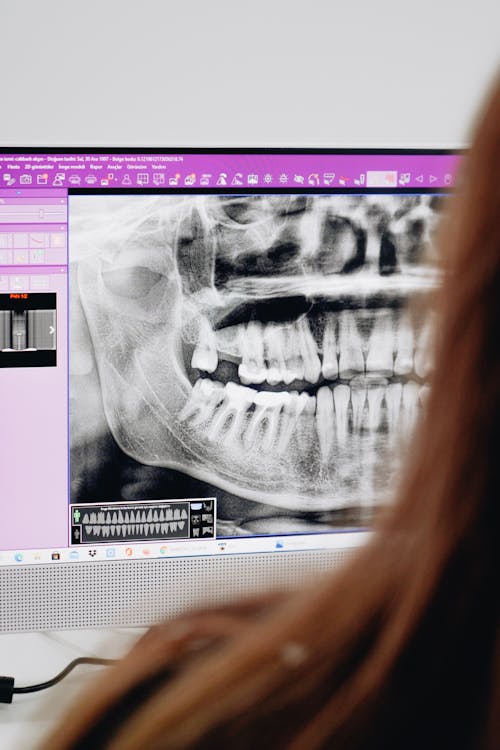
22 Sep Why Are Bi-Yearly Dental Cleanings So Important?
Dental Cleanings Have Changed Over The Years
Dental cleanings have come a long way over the years. In the past, dental cleanings were much more invasive and uncomfortable for patients. Today, however, dental cleanings are much less invasive and far more comfortable for patients. This is due to advances in dental technology and techniques.
In the past, dental cleanings were typically done with metal instruments. These instruments could be quite sharp and often cause discomfort for patients. Today, however, dental cleanings are typically done with softer, more flexible instruments. This makes the process much more comfortable for patients.
In addition, in the past, dental cleanings were often done by hand. This meant that the cleaning could be quite uneven and that some areas of the mouth could be missed. Today, however, dental cleanings are typically done with ultrasonic cleaners. These cleaners are able to reach all areas of the mouth and ensure a more thorough cleaning.
Overall, dental cleanings have come a long way over the years. They are now much more comfortable for patients and more effective at removing plaque and bacteria from the mouth.

How Many Dental Cleanings Should You Have In A Year?
There are varied opinions on this although most dental professionals recommend that patients have at least two dental cleanings per year. This helps to remove plaque and tartar from the teeth, which can lead to cavities and other problems.
You will find that some people may need more frequent cleanings, depending on their oral health history. If you haven’t been consistent in taking care of your teeth, or if you are prone to certain dental issues, you may be asked to come in three to four times a year until your teeth are healthier. Those with gum disease, for example, may need to have their teeth cleaned more often. Your dentist will be able to determine how often you need to have your teeth cleaned based on your individual oral health needs.
What Happens During A Regular Dental Cleaning?
A dental cleaning is a routine procedure that is performed by a dentist or dental hygienist. The purpose of a dental cleaning is to remove plaque and tartar from the teeth, as well as to polish the teeth. Plaque is a sticky film of bacteria that forms on the teeth, and tartar is plaque that has hardened onto the teeth. Here is what you normally look forward to during a cleaning.
1. A dental cleaning generally starts with a consultation in which the dentist or hygienist will ask about your oral health history and any concerns you may have. They will also give you a chance to ask questions.
2. Next, they will do a visual examination of your mouth, looking for any signs of problems such as tooth decay or gum disease.
3. They will then use a small mirror to look at all surfaces of your teeth, both front and back.
4. Once they have a clear view, they will start the cleaning process by using a scaler to remove any plaque or tartar (hardened plaque) from your teeth.
5. They will then use a special toothbrush to clean all surfaces of your teeth and gums.
6. Finally, they will floss between all of your teeth to remove any remaining plaque or food particles.
7. Once the cleaning is complete, they will provide you with information on how to maintain good oral health and may make recommendations for further treatment if necessary.

Are There More Advanced Cleanings?
Yes, there are more advanced cleanings available that can be beneficial for those with certain dental needs. For example, deep cleanings are recommended for those who have gum disease. During a deep cleaning, the dentist or hygienist will clean below the gum line to remove any plaque or tartar buildup. This type of cleaning is usually done over the course of two or more appointments.
Another type of advanced cleaning is called air abrasion. This is a newer procedure that uses a high-powered stream of air and particles to remove plaque and tartar from the teeth. It is generally considered to be more comfortable for patients than traditional scalings and can be used on patients of all ages.
Overall, there are many different types of dental cleanings available, and your dentist will be able to recommend the best one for you based on your individual needs. If you are due for a cleaning, or if you have any concerns about your oral health, be sure to schedule an appointment with your dentist soon.
Can’t It Just Be A Yearly Cleaning?
No one really wants to have more than one dental cleaning a year. You may be one of the many that feel like they can get by with going once and then just ‘taking really good care of your teeth’. While most people think that once a year is sufficient, the reality is that you may need to get more than one dental cleaning per year – especially if you have certain risk factors for gum disease or tooth decay.
Here are a few reasons why you might need to get more than one dental cleaning per year:
1. You Have Gum Disease
If you have gum disease, it’s important to get regular dental cleanings – at least twice a year. This is because gum disease is a progressive condition, meaning it will only get worse over time if it’s not treated.
2. You Have Diabetes
If you have diabetes, you’re at an increased risk for gum disease and other oral health problems. For this reason, your dentist may recommend more frequent cleanings – usually every three to four months.
3. You Smoke Cigarettes
Smoking cigarettes is a major risk factor for gum disease and other oral health problems. If you smoke, your dentist will likely recommend more frequent dental cleanings – at least twice a year.
4. You Have Braces
If you have braces, you’re at an increased risk for tooth decay and gum disease. For this reason, your dentist will likely recommend more frequent dental cleanings – usually every three to four months.
5. You Have a Weak Immune System
If you have a weak immune system, you’re at an increased risk for gum disease and other oral health problems. For this reason, your dentist may recommend more frequent cleanings – usually every three to four months.
If you have any of the above risk factors for gum disease or tooth decay, it’s important to get more than one dental cleaning per year. This will help keep your teeth and gums healthy and prevent further problems down the road.

Are There Alternatives To Dental Cleaning?
So, there are some alternatives to dental cleanings. However, it’s important to remember that these alternatives are not a substitute for professional dental care.
One alternative is to brush and floss regularly. This can help remove plaque and bacteria from your teeth and gums, which can prevent tooth decay and gum disease.
Another alternative is to use an oral irrigator, such as a Waterpik. This can also help remove plaque and bacteria from your teeth and gums.
Finally, you can try using natural remedies to clean your teeth. There are many recipes online for natural toothpaste, mouthwashes, and tooth powders.
Better To Be Safe Than Sorry
If you don’t maintain a regular schedule of bi-annual dental cleanings and checkups, you may be at risk for more serious dental problems down the road. These routine appointments are crucial to preventive care and can help your dentist identify and treat potential issues before they become more serious. Don’t wait until you’re in pain or have a visible problem to seek dental care – by then, it may be too late. Schedule an appointment today and keep your smile healthy for years to come.


Sorry, the comment form is closed at this time.